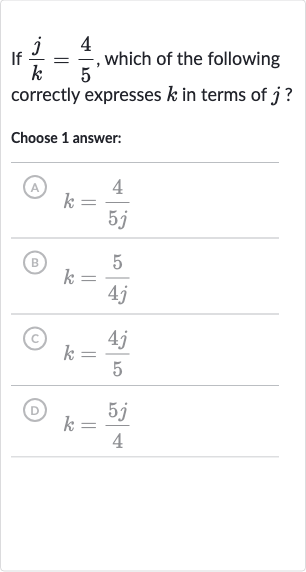Full solution
Q. If , which of the following correctly expresses in terms of ?Choose answer:(A) (B) (C) (D)
- Given equation: We are given the equation . To find in terms of , we need to solve for .
- Multiply by : Multiply both sides of the equation by to get rid of the denominator on the left side: .
- Simplify equation: This simplifies to because the 's cancel out on the left side.
- Isolate : Now, to solve for , we need to get by itself on one side of the equation. We can do this by multiplying both sides of the equation by and then dividing by .
- Multiply by : Multiplying both sides by gives us .
- Divide by : Now, divide both sides by to isolate : .
- Final expression: We have now expressed in terms of . The correct expression is , which corresponds to answer choice (D).

